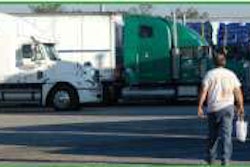Look back 50 years at any industry and it’s obvious that much has changed, yet some core elements remain constant. Review Overdrive’s early years and you’ll find echoes of today’s topics: conflicts with carriers and regulators, complaints about truck stops, concerns about the quality of equipment. A blurb on the cover of the first issue, September 1961, perhaps says it all: “OUR READERS GRIPE.”
Even so, I think owner-operators’ tendency to gripe has waned – well, at least a tad – since those days. Truck stops offer more comprehensive services. Communications technology makes life on the road far less lonely. Trucks are far more efficient, comfortable and durable. Many carriers have learned they can’t attract or retain the best drivers if they pay them like hamburger flippers or treat them like cotton-pickers.
One major source of griping that’s diminished, one that’s harder for newer owner-operators to appreciate, is the business-political climate. If you read Senior Editor Todd Dills’ excellent recap of the history of the owner-operator business model in our 50th anniversary issue, you’ll get a better idea. The absurd restrictions that reigned prior to deregulation put owner-operators at extreme disadvantage. Also, unionization pressure from the Teamsters could be high in spite of what little the union could really do for a self-employed owner-operator. Resulting conflicts were much nastier than what’s going on today with state and federal initiatives that could undermine the independent contractor status.

Those conflicts, along with the pressure of rising fuel prices, occasionally resulted in shutdowns and other protests. Owner-operators still now and then call for shutdowns over various issues. They remember when a large-enough portion of the trucking workforce could do something disruptive enough to make news.
Such calls generally don’t go anywhere today – and that’s not all bad. Since deregulation, owner-operators enjoy a more free environment, with plenty of opportunity to operate independently. Successful owner-operators are very entrepreneurial, largely able to control their own profitability. They can lobby through the same political channels everyone else uses, or through their own trade group (the Owner-Operator Independent Drivers Association) to achieve policy changes or take grievances to court.
This is not to say that trucking has evolved into the nirvana of careers. There are more than enough crooked brokers, stingy carriers, clueless regulators and stupid four-wheelers to ruin any driver’s week.
The important thing is that the owner-operator has come into his own as a legitimate self-employed business owner able to deal with such opposition. The long-haul lifestyle isn’t for everyone, but the owner-operator model is sound. It offers great rewards for those who approach it like a business.
Overdrive is proud for the role it played in freeing up the marketplace for drivers who wanted to own their own truck and operate with independence. Overdrive is proud of the role it continues to play in helping owner-operators get ever better at mastering the challenging job they do.











